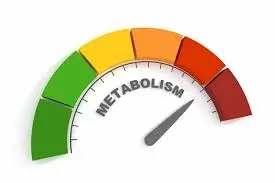What is Metabolism & How Does it Work?
Metabolism is the complex set of chemical reactions that occur within the body’s cells to maintain life. These biochemical processes are responsible for converting food and other substances into energy and building blocks necessary for cellular functions, growth, and maintenance.
What is a Metabolism/
The systems that regulate how your body produces and utilizes energy are called metabolism. Your body uses it to turn meals and liquids into energy that you may utilize when you’re moving and when you’re sleeping. It is essential for several basic processes, including breathing and growth. To create and release energy that the cells in all of your organs and tissues can use, your metabolism requires oxygen and calories.
The amount of energy your body stores and expends depends on your metabolism. When individuals talk about diet, weight, and health, they may bring up metabolism. subsequently could appear high, low, sluggish, or fast.
You may believe that your metabolism—whether it’s quick or slow—is inherited from your parents. It does appear that some people have a strong metabolism from birth and can eat everything they want without gaining any weight. However, you have some influence over several factors that impact your weight and metabolism.
There are two metabolic processes:
Our metabolism is complicated; in short, it consists of two components that the body carefully regulates to maintain equilibrium. They are:
Catabolism –The breakdown of food ingredients (such as proteins, carbs, and dietary fats) into their more basic forms, known as catabolism, allows for the production of energy and the fundamental building blocks required for development and repair.
Anabolism – The metabolic process that builds or repairs our bodies is called anabolism. Energy, which is ultimately obtained from our diet, is necessary for anabolism. Our bodies usually retain surplus nutrients as fat when we consume more than we require for daily anabolism.
Basal Metabolic Rate: What Is It?
The term “basal metabolic rate,” or “BMR,” refers to the quantity of calories your body needs to operate without exertion. Your BMR provides your body with the energy it requires for several essential processes that go place constantly without your conscious awareness. For instance, you require it to:
- Take in the air via your lungs.
- Get your blood pumping.
- Dissect your meal.
- Develop and Heal
- Create and regulate your hormone levels.
- Keep your body warm.
People’s BMRs might vary greatly. Nevertheless, your BMR may vary depending on:
- Your level of muscle
- How much body fat do you have?
- What is your age?
- The number of calories you consume
- Your level of activity
Although at least one research found no effect of sex on BMR, other individuals believe it does. Exercise could also influence your BMR, but it’s not simple to detect how. It could go down if you need to relax a lot. A significant amount of running followed by a pause might lower your BMR. Additionally, there are other reasons why your BMR may be different that are unknown to scientists and medical professionals.
Additionally, your BMR may alter. Your BMR will decrease, for instance, if you attempt to dramatically reduce your calorie intake and weight. Because of this, it may appear that you will lose weight quickly at first, but subsequently, it will slow down.
The differentiation across a slow and quick metabolism:
By having a “fast metabolism,” you burn a lot of calories even while you’re at rest. Your body may survive on fewer calories and less food if your metabolism is sluggish. However, you might be surprised to learn that a person’s weight isn’t necessarily correlated with their metabolic speed. A large number of persons with quick metabolisms, or BMRs, may be obese or overweight. Therefore, being skinny isn’t necessarily a result of having a high metabolism. Numerous additional variables, like your level of activity, food intake, and food choices, will affect your weight.
Rate of metabolism:
Three factors make up your body’s metabolic rate, often known as total energy expenditure:
Basal metabolic rate (BMR): The body requires energy (kilojoules) to maintain all of its systems operating properly, including breathing, heartbeat for blood circulation, cell growth and repair, and hormone regulation, even while at rest. The majority of your daily energy expenditure (between 50 and 80 percent) is attributed to your body’s BMR.
Another term for the thermogenic influence of food is thermogenesis, which is the process by which your body uses energy to break down the food and liquids you consume in addition to absorbing, moving, and storing their contents. Five to ten percent of the energy is used by your body for thermogenesis.
That amount of energy used during exercising: Physical activity includes both scheduled exercise, such as running or playing sports, and any unplanned activities, such as playing with the dog, hanging out the laundry, or simply fidgeting.
The aforementioned element accounts for 20% of our average daily energy intake, depending on a moderately active individual who exercises 30 to 45 minutes of moderately intensive physical activity daily.
BMR, or basal metabolic rate:
The amount of energy your body requires to be balanced is known as your body’s metabolic rate or BMR.
Since maintaining lean mass takes a lot of energy, your overall lean mass—especially your muscle mass—determines your BMR in big part. Losing lean mass will finish up in a drop in your BMR.
When trying to lose weight, it’s critical to maintain or even grow your lean muscle mass through exercise since your BMR makes up a significant portion of your overall energy intake.
As consuming too few kilojoules promotes the body to slow the metabolism to preserve energy, this requires combining exercise (especially weight-bearing and resistance workouts to enhance muscle mass) with dietary modifications toward healthy eating patterns.
Sustaining lean muscle mass also helps reduce your chance of injury while training and exercise increase your daily energy consumption.
Despite variations throughout the day, the rate of energy expenditure remains consistent. Early in the morning is often when the rate of energy expenditure is lowest.
Things that influence our BMR:
Several interrelated factors affect your BMR, these being:
Body size: Adults with larger bodies have higher BMRs and more tissue that is used for metabolism.
Lean muscular tissue mass: Muscle has a high calorie-burning capacity.
quantity of body fat: Compared to the majority of other bodily tissues and organs, fat cells are “sluggish” and need a lot less kilojoules.
Eating too few kilojoules, whether through crash dieting, starvation, or fasting, causes the body to reduce its metabolism to preserve energy. BMR may decrease by as much as 15%, and this decrease is exacerbated if lean muscle mass is also decreased.
Age: As people age, their metabolism slows down because of hormonal and neurological changes as well as the loss of muscle mass.
Development: Because of the energy needs of development and the additional energy required to regulate body temperature, babies and children have greater energy demands per unit of body weight.
Gender: Due to their tendency to be bigger, males often have quicker metabolisms.
Genetic predisposition: Your genes may play a role in determining your metabolic rate.
Hormonal and neurological controls: The hormonal and neurological systems govern BMR. The body’s rate of kilojoule burn can be affected by hormonal imbalances.
Environmental temperature: The body must exert more effort to maintain a normal body temperature under extremely cold or extremely hot conditions, which raises the BMR.
When there is an infection or disease, the body needs to work harder to produce new tissues and mount an immunological response, which raises BMR.
Physical activity level: muscles that work hard require a lot of energy to burn. Frequent exercise trains the body to burn calories more quickly even while at rest and builds muscular growth.
Substances that raise the BMR include nicotine and coffee.
Dietary deficiencies: a diet deficient in iodine, for instance, slows metabolism and lowers thyroid function.
How does weight relate to metabolism?
Many individuals believe that weight gain or reduction is caused by metabolic issues. However, your metabolism automatically adjusts to the unique requirements of your body. Rarely is it the only factor contributing to weight gain or decrease. You will often lose weight if your body burns more calories than you consume (and vice versa). However, several variables influence how many calories your body requires, many of which are unpredictable or unknown.
Metabolic disorders: what are they?
Any ailment that arises when there is a problem with how your body uses energy to function is referred to as a metabolic disease. Because there are so many different processes involved in metabolism, there are several forms of metabolic illnesses. These illnesses also have a wide range of symptoms, as you might expect.
Numerous circumstances can lead to metabolic problems, such as:
nutrition deficiencies. For example, insufficient calcium absorption due to low vitamin D levels may affect bone health. Iron deficiency can result in anemia.
Too little or too many calories. A reduced calorie intake over time may slow down your metabolism. Gaining weight might result from consuming too many calories.
deficits or problems with enzymes. When your body lacks an enzyme required to break down certain proteins, it can result in inherited disorders like phenylketonuria (PKU).
imbalances in hormones. Hypothyroidism is one thyroid condition that can slow down your metabolism, leading to weight gain and exhaustion. It can be accelerated by hyperthyroidism, which results in weight loss.
the consequences of drugs, chemicals, and poisons. Insulin resistance and weight gain can result from long-term corticosteroid use. Drinking too much alcohol can interfere with liver metabolism.
Metabolic illnesses fall into two basic categories: acquired metabolic disorders, which can arise later in life, and hereditary metabolic disorders, which are inherited.
Acquired metabolic diseases:
Throughout your life, you may acquire certain metabolic abnormalities. Hormone abnormalities are a common feature of many of these metabolic diseases, which are endocrine system illnesses. Autoimmune assaults or damaged or sick organs can induce acquired metabolic abnormalities. However, there are further factors as well.
Acquired metabolic abnormalities include, for instance:
- The most prevalent acquired metabolic disease is diabetes.
- Hyperthyroidism and hypothyroidism are examples of thyroid disorders.
- Obesity and underweight
- The metabolic syndrome
- Resistance to insulin
- Cushing
Hereditary metabolic diseases:
A class of illnesses known as inherited metabolic diseases, or inborn errors of metabolism, impact how your body uses specific nutrients or enzymes. They are the consequence of a genetic alteration (variant) in your DNA. One or both of your biological parents may pass them on to you.
There are hundreds of genetic metabolic illnesses, many of which are rare. Here are several examples:
- Glycogen storage disorders
- Hemochromatosis
- Disorders of lysosomal storage
- Urinary illness caused by maple syrup
- Diseases of the mitochondria
- Tay-Sachs illness
- Wilson illness
How can my metabolism be in good shape?
Most of the time, you do not influence the state of your metabolism or your metabolic rate. However, following these methods might improve your general health and metabolism:
Regularly consume well-balanced meals. Don’t miss meals. When your metabolism has a consistent supply of energy, it functions at its peak efficiency. The rate of metabolism may slow down if you skip meals or consume insufficient calories.
Pay attention to wholesome foods. Choose fresh fruit, lean proteins, whole grains, and healthy fats.
Continue to be active. Building muscle is aided by exercise, particularly resistance and strength training. More calories are burned by muscle than by fat, even when at rest.
Make sure you get adequate rest. Sleep deprivation can alter hormones and impair your body’s capacity to use energy effectively.
Drink plenty of water. The effective functioning of your body’s metabolic systems is facilitated by drinking adequate water. Any amount of dehydration could reduce the metabolism.
Steer clear of prolonged fasting or drastic diets. Your body may store energy if you drastically reduce your caloric intake or fast for an extended period.
Hormonal metabolism disorders:
Our metabolism is regulated in part by hormones. The thyroid is impacted by some of the most prevalent hormonal conditions. The hormones secreted by this gland regulate energy expenditure, or the rate at which kilojoules are burned, among other metabolic processes.
Thyroid conditions include:
Hypothyroidism (underactive thyroid) -Underactive thyroid disease, or hypothyroidism, causes the thyroid gland to produce insufficient amounts of hormones, which slows metabolism. An autoimmune disorder called Hashimoto’s disease is one frequent cause. Constipation, melancholy, lethargy, and unexpected weight gain are some signs of hypothyroidism.
In hyperthyroidism (overactive thyroid), the gland speeds up metabolism and produces more hormones than is required. Increased hunger, weight loss, anxiety, and diarrhea are a few signs of hyperthyroidism.
Metabolic illnesses caused by genetics:
Our genes serve as the blueprints for the proteins that make up our bodies, and it is the proteins that carry out the processes of food digestion and metabolism.
A metabolic illness can occasionally arise from a defective gene that causes us to create a protein that is inefficient in processing our meals. With careful dietary management, hereditary metabolic abnormalities may often be controlled under medical supervision.
The symptoms of hereditary metabolic abnormalities might be quite similar to those of other illnesses and diseases, making it difficult to establish the actual cause. See your doctor if you feel you have a metabolic problem.
Among the hereditary metabolic diseases are:
The inability to digest fructose, a kind of sugar present in fruit, fruit juices, sugar (such as cane sugar), honey, and some vegetables, is known as fructose intolerance.
The inability to convert galactose into glucose is known as galactosemia. Nature does not include galactose alone. It is created when the human gastrointestinal tract breaks down lactose, which is found in milk and other dairy goods like cheese and yogurt, into galactose and glucose.
The inability to convert the amino acid phenylalanine into tyrosine is known as phenylketonuria (PKU). Brain injury can result from elevated blood levels of phenylalanine. Foods high in protein and those that contain aspartame, an artificial sweetener, should be avoided.
Summary
All of the chemical reactions your body requires to break down meals and provide you with energy when you’re moving and when you’re sleeping are included in metabolism. Although your genes determine certain parts of metabolism, you may affect others by altering your diet and level of physical activity. However, being thin or overweight is not necessarily a result of having a quick or sluggish metabolism.
FAQs
How can I increase the rate of my metabolism?
Although you can’t alter every aspect of your metabolism, you may increase it with the aid of good habits. The amount of muscle or fat you have, the type and quantity of food you eat, and your level of activity are some factors that might impact metabolism. Ask your doctor for advice if you wish to speed up your metabolism to reduce weight.
What factors contribute to a sluggish metabolism?
For a variety of intricate reasons, some people have slower metabolisms than others. However, abruptly reducing your level of exercise may also cause your metabolism to slow down. Your metabolism may slow down as you age, but this happens gradually. Your age may not be the main cause; it can be more related to your lack of exercise or muscle mass.
Which two forms of metabolism are there?
Anabolism and catabolism are the two primary forms of metabolism. Building larger molecules from smaller ones is the process of anabolism. The reverse is catabolism. The human organism breaks reduced bigger molecules into smaller ones as well.
Which three phases of metabolism are there?
Phase 1: Amino acid breakdown, fatty acid ß-oxidation, or glucose glycolysis.
Stage 2: Kreb cycle or citric acid cycle
Stage 3: ATP production and the electron transport chain.
Which metabolism is considered normal?
The daily BMR of an average male is about 7,100 kJ, whereas that of an average woman is about 5,900 kJ.
References
- Professional, C. C. M. (2024d, December 19). Metabolism. Cleveland Clinic. https://my.clevelandclinic.org/health/body/21893-metabolism
- Morgan, K. K. (2024, March 5). Understanding Your Metabolism. WebMD. https://www.webmd.com/fitness-exercise/what-is-metabolism
- Rd, H. W. (2024, January 11). 8 Ways That May Speed Up Your Metabolism. Healthline. https://www.healthline.com/nutrition/10-ways-to-boost-metabolism




91 Comments